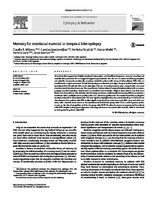- DSpace Principal
- →
- Hospital El Cruce
- →
- Publicaciones
- →
- Artículos
- →
- Ver ítem
JavaScript is disabled for your browser. Some features of this site may not work without it.
Mostrar el registro sencillo del ítem
| dc.contributor.author | Múnera, Claudia | |
| dc.contributor.author | Lomlomdjian, Carolina | |
| dc.contributor.author | Terpiluk, Verónica | |
| dc.contributor.author | Medel, Nancy | |
| dc.contributor.author | Solís, Patricia | |
| dc.contributor.author | Kochen, Silvia | |
| dc.date.accessioned | 2016-05-31T16:30:03Z | |
| dc.date.available | 2016-05-31T16:30:03Z | |
| dc.date.issued | 2015 | |
| dc.identifier.uri | http://repositorio.hospitalelcruce.org/xmlui/handle/123456789/384 | |
| dc.description | Fil: Kochen, S. Hospital de Alta Complejidad en Red El Cruce Dr. Néstor C. Kirchner. Centro Nacional de Alta Complejidad en Neurociencias y Neurocirugía. Florencio Varela, Argentina. | es_AR |
| dc.description.abstract | Several studies suggest that highly emotional information could facilitate long-term memory encoding and consolidation processes via an amygdala-hippocampal network. Our aim was to assess emotional perception and episodic memory for emotionally arousing material in patients with temporal lobe epilepsy (TLE) who are candidates for surgical treatment. We did this by using an audiovisual paradigm. Forty-six patients with medically resistant TLE (26 with left TLE and 20 with right TLE) and 19 healthy controls were assessed with a standard narrative test of emotional memory. The experimental task consisted of sequential picture slides with an accompanying narrative depicting a story that has an emotional central section. Subjects were asked to rate their emotional arousal reaction to each stimulus after the story was shown, while emotional memory (EM) was assessed a week later with a multiple choice questionnaire and a visual recognition task. Our results showed that ratings for emotional stimuli for the patients with TLE were significantly higher than for neutral stimuli (p = 0.000). It was also observed that patients with TLE recalled significantly less information from each slide compared with controls, with a trend to lower scores on the questionnaire task for the group with LTLE, as well as poorer performance on the visual recognition task for the group with RLTE. Emotional memory was preserved in patients with RTLE despite having generally poorer memory performance compared with controls, while it was found to be impaired in patients with LTLE. | es_AR |
| dc.language.iso | en_US | es_AR |
| dc.subject | Memoria | es_AR |
| dc.subject | Procesos Mentales | es_AR |
| dc.subject | Epilepsia del Lóbulo Temporal | es_AR |
| dc.title | Memory for emotional material in temporal lobe epilepsy | es_AR |
| dc.type | Article | es_AR |
Ficheros en el ítem
Este ítem aparece en la(s) siguiente(s) colección(ones)
-
Artículos
Articles

